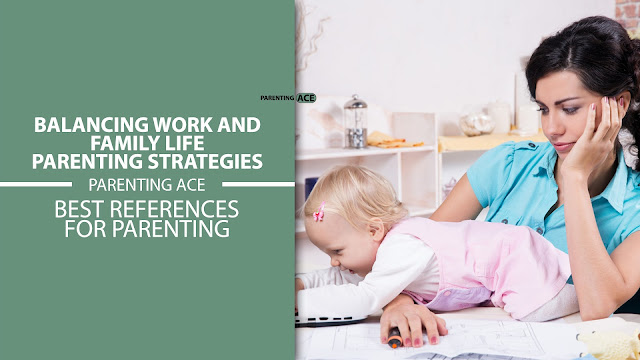Balancing Work and Family Life: Strategies for Effective Parenting
Finding the delicate balance between a demanding career and fulfilling family life is a universal struggle for many parents. As a counselor and developmental psychologist deeply invested in family dynamics, I recognize the challenges parents face in navigating these dual responsibilities. In this blog post, we delve into practical strategies and insightful tips to help parents effectively harmonize their work commitments with the joys of family life. From prioritizing and setting boundaries to embracing flexible work arrangements and practicing self-care, join us as we explore how to cultivate a balanced and enriching lifestyle that nurtures both professional success and family well-being.
 |
| Balancing Work and Family Life: Parenting Strategies |
How Can Parents Effectively Balance Work And Family Life?
Balancing work and family life has become a significant challenge for many parents in today's fast-paced world. As a counselor and developmental psychologist, I understand the importance of finding equilibrium between professional obligations and family responsibilities. In this article, we'll explore effective strategies for parents to achieve a harmonious balance between work and family life while nurturing their children's development.
Understanding the Challenges
The modern workplace often demands long hours and high levels of commitment, making it difficult for parents to allocate sufficient time and energy to their families. Additionally, technological advancements have blurred the boundaries between work and home life, further complicating the situation. As a result, many parents experience feelings of guilt, stress, and exhaustion as they attempt to juggle multiple roles.
Effective Strategies for Balancing Work and Family Life:
- Prioritize and Set Boundaries: Identify your priorities both at work and at home, and establish clear boundaries to ensure that each aspect of your life receives adequate attention. Learn to say no to non-essential commitments and delegate tasks when necessary.
- Flexible Work Arrangements: Explore flexible work options such as telecommuting, flextime, or compressed workweeks to better accommodate your family's needs. Negotiate with your employer for arrangements that allow you to fulfill your professional duties while being present for important family moments.
- Time Management Skills: Enhance your time management skills by creating schedules, setting realistic goals, and allocating time for both work and family activities. Use tools such as calendars and to-do lists to stay organized and prioritize tasks effectively.
- Quality Over Quantity: Focus on the quality of time spent with your family rather than the quantity. Engage in meaningful activities, such as shared meals, conversations, and recreational outings, that promote bonding and connection.
- Self-Care: Prioritize self-care to maintain your physical, emotional, and mental well-being. Make time for activities that recharge you, such as exercise, hobbies, and relaxation techniques. Remember that taking care of yourself enables you to better support your family.
- Communication and Collaboration: Foster open communication with your partner and children to ensure that everyone's needs and concerns are heard and addressed. Collaborate with your family members to share responsibilities and support each other in managing household tasks and childcare duties.
- Seek Support: Don't hesitate to seek support from family, friends, or support groups when needed. Surround yourself with a supportive network that can offer encouragement, advice, and assistance during challenging times.
Balancing work and family life is a complex endeavor that requires intentionality, adaptability, and perseverance. By implementing effective strategies such as prioritizing, setting boundaries, utilizing flexible work arrangements, and practicing self-care, parents can create a harmonious balance between their professional and family roles. Remember that achieving balance is an ongoing process, and it's okay to seek help and make adjustments along the way. As a counselor and developmental psychologist, I encourage parents to prioritize their well-being and nurture strong, healthy relationships with their families, ultimately fostering a fulfilling and enriching family life.




